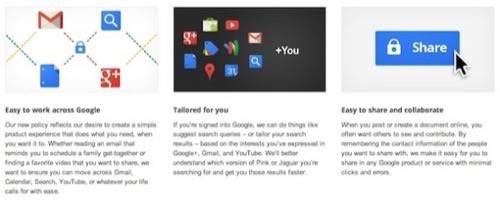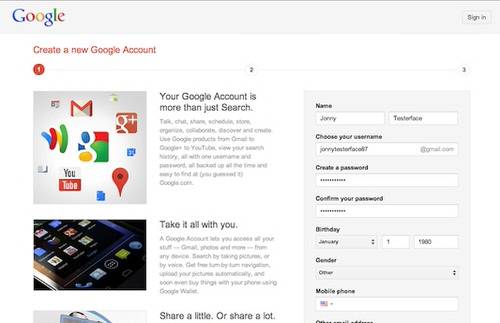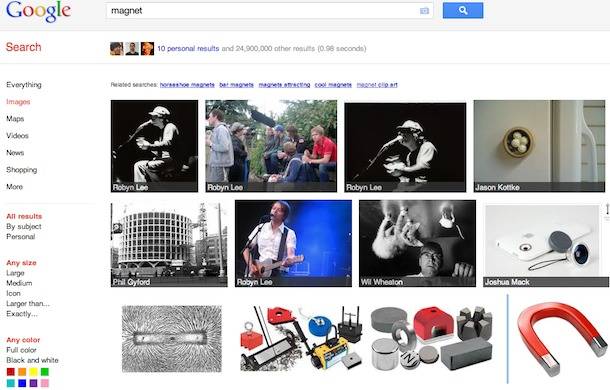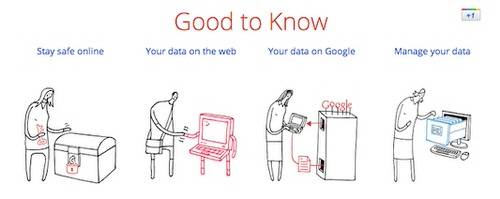Editor’s note: This post was originally published on January 26, but it has been bumped up due to the March 1 launch of the privacy policy. Google updated its privacy policy on Tuesday, January 24. It replaced more than 60 separate policies with a single one that treats Google users and their data as the same across all Google services. Reactions were shrill. “The End of ‘Don’t Be Evil'” was trotted out for the umpteenth time. The Washington Post quoted privacy experts saying, “There is no way anyone expected this.” My, that sounds terrible!

But it’s not true. Everyone watching should have seen this change coming. Google executives have maintained for so long that their new direction is one unified Google product. The new policy doesn’t track any new data. It doesn’t change the user’s settings. Users can still export all their data and leave Google forever. All this does is change perception.

It’s Nothing New
Before, every Google service was a different website. After March 1, they’ll all be treated as one. The old arrangement meant that each service had its own privacy policy. That doesn’t mean it was more private. Google still tracked users. It still shared data from some of its services with others.
On March 1, the rules become much simpler: Google is all one thing. If you use it, it tracks your usage, it stores your data, and it uses your activity to personalize its services for you. Every single way in which it will do so is clearly laid out.
Today, members of Congress sent a letter to Google CEO Larry Page about the policy. They said it raises questions about whether consumers can opt-out of the new data sharing system either globally or on a product-by-product basis.” That is crazy talk. You opt out “globally” by not using Google. That’s how privacy policies work. It’s true that you can’t opt out of the privacy policies for individual services anymore. You know what you can do? Stop sharing things you don’t want tracked.

Reflexively Reacting
To make sure I wasn’t crazy for thinking this way, I spoke to Colin Zick, a partner at Boston law firm Foley Hoag and contributor to its blog, Security, Privacy and the Law.
In his post about Google’s new policy, he noted that “[t]hese changes are likely to draw FTC scrutiny, especially in light of the recent decision by Google to incorporate data from its social network, Google+, into search results, which has already resulted in a FTC antitrust investigation.” I asked Zick if these concerns are warranted.
“What we have is not a reaction to a change in legal language. It’s a change in perception.” – Colin Zick
“From a legal perspective, I’m not seeing anything that’s much different in what’s being proposed to take effect on March 1 and what’s in place right now,” Zick says. “In particular, the language about sharing across services has been in [Google’s policies] for a long time.”
Zick points out that all the past versions of Google’s privacy policies are on the website, and the last two versions offer line-by-line comparisons to the previous version. Zick expects that Google will do the same with the new policy once it’s officially issued.
“What we have is not a reaction to a change in legal language,” Zick says, “but it’s a change in perception. … People are just reflexively reacting to the idea that Google is big.”
Google Is Not Off The Hook Here
There are perfectly good things not to like about Google’s new direction. For example, its community management strategy for Google+ is broken. Its names policy is only designed around appearances. As long as your name looks “real” to robots and engineers, you can go nuts. But you still can’t use a handle, nor can you use a pseudonym unless it’s “established,” and you can prove it with some form of identification.
This is a misguided policy. It doesn’t protect politically active, marginalized or victimized users who still want to use Google+ but can’t have it connected to their identities. You can step back even further and argue that it doesn’t reflect the way human identity works at all.
“Pseudonymity makes it possible for the most marginalized people in our community to communicate with us.” – Cory Doctorow
“Identity is prismatic,” as Chris Poole so eloquently told us at Web 2.0 last year. Google (and Facebook) want to lock users into a single identity on the Web as far as their services are concerned. There’s no question that Google’s new direction is to be a bigger part of its users’ lives.

You Don’t Have To Like It
The idea of what Google is has grown. This month, Google unveiled Search plus Your World, its integration of Google+ social results into Web search. Google+ had already been integrated into YouTube, Gmail and so many other Google services. But search was the Google we used to know. The change upset people, myself included.
Google has been accused of breaking a promise about how it should work. Its founders used to pride themselves on the fact that Google search didn’t favor its own services. Google has been scrutinized for years for backpedalling on that stance, but Search+ has been treated as a last straw. For people who don’t use Google+, Search plus Your World doesn’t work.

But this is the new Google. You don’t have to like it. If you don’t like Search plus Your World, you can opt right out. You can opt out of sharing browser history by using incognito mode. You can also opt out of targeted ads. You can’t opt out of Google’s new privacy policy, because that’s how Google’s business is going to work from here on out. The data you create anywhere on Google are available to the rest of Google. Google is one big service for better or for worse. You don’t have to use it.

No One Is Making You Use Google
The new privacy policy changes the way it feels to use Google, but it doesn’t change the way it works. What are people afraid of Google tracking? Their name and address? Their location? The contents of their email? Their Web browsing habits? Google already tracked these things. So does Facebook. So does everybody. These are things you choose to share with Google. Who said you had to use Google? It’s not the power grid. It’s not the sewer system.
You have a choice. You can choose between Google’s new direction, an all-in-one, twice-a-day everything-service its executives want you to use like a toothbrush, or Google’s competitors. There are plucky start-up search engines out there that might remind you of classic Google. Microsoft also has a social search engine, a free email service and a suite of cloud-based office software. Oh, you don’t like them as much? Boo hoo!
Google is making its move. It’s changing its nature. Some changes are bad, and other changes are good. Users who like the changes will be happy, users who hate them will be sad. Google offers more tools than anybody else to give its users control over their data. As it says in the overview of its new privacy policy, users who don’t like the new direction are welcome to export their data and take it elsewhere.

What do you think? Has Google gone too far? Will you take your Web activities elsewhere? Share that with us in the comments.










